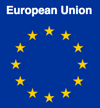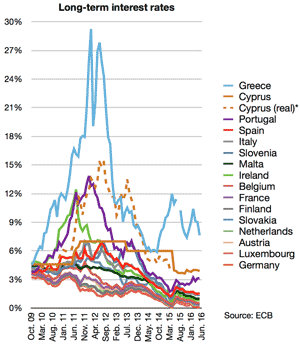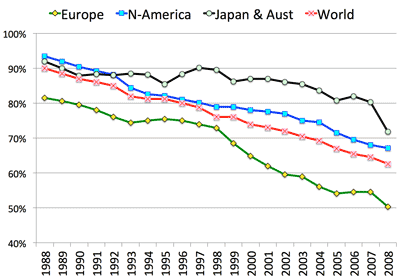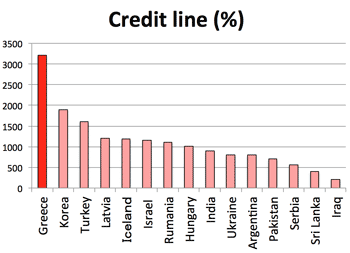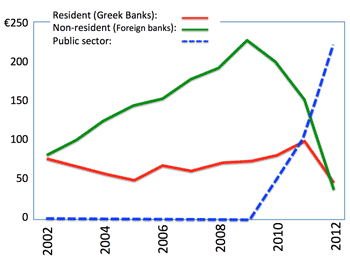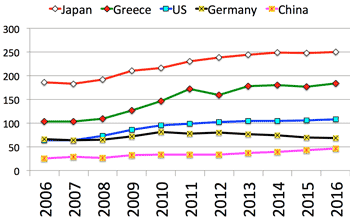>Top <FT Series: How the euro was saved>
2011/11/3-4 G20 Summit at Cannes> The Big Read
- Angel Merkel, German chancellor said angrily, tears welling: "That is not fair... I am not going to commit suicide."
- It was shocking enough to watch Europe's most powerful and emotionally controlled leader brought to tears.
- The two objects of her ire; French Nicolas Sarkozy and US Barack Obama.
- Greece was imploding politically; Italy, a country too big to bail out; Ms Merkel could not be convinced to increase German contributions to the eurozone's firewall.
- It was the feeling that with the contagion, at tis point, you were on the brink of explosion.
- When the history of the eurozone crisis is written, late 2011 through 2012 will be remembered as the forever changed the European project.
- Strict budget rules were made inviolable; banking oversight was stripped from national authorities; and the printing presses of ECB would become the lender of last resort for m
- On 2011/10/27 in Brussels, George Papandreou (Greek political dynasty, leader of PASOK) had agreed to the largest sovereign default in history - a €200B debt restructuring that cut what Athens owed private bondholders in half.
- That weekend, he would call a national referendum on the new €172B bailout programme. Those criticizing the agreement, would be forced to pick sides, and most would back the rescue - particularly since without EU bailout funds, disorderly default and euro exit was the likely outcome.
- Mr. Papandreou presented his plan as a fait accompli to parliamentarians from his centre-left PASOK party.
- Yields on Greece's benchmark 10-year bond spiked by 16.2% in a single day.
- Mr Sarkozy's initial reaction was to force Mr Papandreou to reverse course; that either he accept the new bailout conditions immediately or Greece would be forced out of the euro.
- Mr Sarkozy called Ms Merkel and agreed a strategy. They would summon Mr. Papandreou to Cannes, where the G20 was to get under way in just 48 hours, and persuade him to hold a referendum on whether Greece would remain in the eurozone.
- In Berlin, Ms Merkel was torn over the issue of Grexit, with several advisors - particularly Wolfgang Schäuble, her powerful finance minister.
- >Top Mr Nicolas Sarkozy summoned his fellow leaders to the Palace in Cannes (2011/11/3), an hour before they were due to meet Mr George Papandreou, to agree on how to confront him. Those invited included Ms Merkel; Jean-Claude Juncker (Luxembourg prime minister); Chirstine Lagarde (managing director of IMF); and EU's two presidents, José Barroso and Herman Van Rompuy.
- Mr Sarkozy's six-point plan was clear and tough; Mr Papandreou must accept the bailout plan agreed the week before, and no further aid would be forthcoming until his parliament voted its assent.
- The referendum shall be only on the membership of Greece in the euro area and the EU.
- Mr Papandreou's referendum had created a dilemma for Greece but it also gave rise to a much greater fear that contagion from Athens would spread across the eurozone. No country posed more of a contagion danger than Italy.
- With nearly €2,000B in sovereign debt - the fourth-largest debt pile in the world - Italian estimated a three-year bailout programme would cost about €600B. There was not enough money in EU or IMF to foot that bill. Italy was simply too big to bail.
- We could not afford Italy, said a French finance ministry official. No one could afford Italy, so that was the end probably of the eurozone.
- Ms Christine Lagarde (IMF) arrived in Cannes with a plan to put Italy into an €80B precautionary programme, a line of credit that could be used in emergency but would also come with intensive monitoring. Only then, would markets begin lending again at sustainable rates.
- Sovereign debt (2011): Italy €1,907B; Greece €355B; Portugal €185B; Ireland €169B.
- Once Mr Papandreou and Mr Venizelos arrived in the conference room, Mr Sarkozy began 'the full Sarkozy': a pointed, angry denunciation of Mr. Papandreou's referendum decision.
- "We've done everything to help you, we've done everything to keep you in the eurozone, we've taken financial, political risk. It's "he biggest debt restructuring in the world, ever, and now what you do is you betray us"
- The position of Sarkozy was very offensive. It was not polite. Very, very strong and very offensive, in order to put Greece in a dilemma: in or out."
- The Greeks attempted to fight back. The referendum would be in a month's time, and it would force Mr Antonis Samaras (leader of Greek ND, New Democracy) and his own PASOK rebels to fall into line, since even his most virulent mainstream critics could not oppose the country's only lifeline to staying in the eurozone.
- Then Mr Papandreou read his proposed wording for the referendum.
- Ms Merkel was the first to respond, and she was not happy. "We either solve this among ourselves here, or we will fail in the eyes of the world. We must decide. Either you want to stay in the euro or go out."
- Unbeknown to Mr Sarkozy or Ms Merkel, Mr José Barroso (Portuguese politician, President of EC, 2004-14) had called Mr Samaras, the Greek opposition leader, from his hotel before the meeting. He knew Mr Samaras was desperate to avoid the referendum. Mr Samaras told Mr Barroso he was now willing to sign on to a national unity government between his New Democracy party and PASOK (Panhellenic Socialist Movement).
- They began discussing names of possible technocrats to take over from Mr Papandreou in a national unity government. The first person was Lucas Papademos, who had left his post as vice-president of ECB a year earlier.
- "We have to kill this referendum," Mr Barroso said. This idea would also be the end of Mr Papandreou.
- For months Barack Obama had been watching the eurozone crisis with frustration and mounting concern.
- Tim Geithner, US Treasury secretary had tried to impart lesson learnt during their banking crisis.
- "The eurozone has to be saved because otherwise we'll enter into a depression in Europe, and this will impact the economy of US and my reelection."
- The awkwardness was epitomized by Washington's relationship with Ms Merkel, who occasionally found US intervention improper and unwelcome. Berlin had pushed for the Washington-based IMF to be part of the crisis response.; Merkel would tell colleagues that European decisions should be made by Europeans.
- Still, many in Brussels, Frankfurt and Paris welcomed American intervention, particularly as a counterweight to Berlin.
- Although the two leaders appear similarly cerebral and unemotional; their styles are fundamentally different. Mr Obama can be professorial and lecturing, something Ms Merkel finds off-putting. Ms Merkel shuns such academic musings and is more short-term and tactical in her decision-making
- On other occasions, the German government called on Washington to push struggling eurozone countries to implement promised reforms.
- When eurozone leaders were summoned again by Mr Sarkozy in Cannes, several were surprised to find Mr Obama chairing the meeting. It was also a signal that Europe was not able to do that; it was a sign of weakness.
- Many in the room expected the evening to be dedicated to persuading Mr. Silvio Berlusconi to accept IMF assistance. The Italians had rejected it that morning, arguing it would create the impression they could not handle the crisis on their own. They countered with an offer to accept IMF monitoring, but not funds.
- Mr. Obama had a new plan to increase the size of the eurozone firewall - an idea that put Germany front and centre.
- The most obvious source for that firewall was ECB, having the power to print money. US had demonstrated the crisis-fighting power of a central bank when FRB bought up huge tracts of Treasuries in the wake of Lehman Brothers' collapse.
- But Berlin has long opposed using a central bank to fund governments. German opposition was rooted in tis dark history; the hyperinflation of the interwar years that helped doom the Weimar Republic had been caused, in part, by central bank printing presses.
- At German insistence, ECB had been modelled after the Bundesbank, which was given complete independence from meddling politicians when it was established in 1950s, to avoid a repeat of 1920s. The German government also demanded that EU's 1992 Maastricht treaty, which laid the foundations for the euro's creation, bar ECB from buying sovereign bonds.
- Both Mr Geitner and Mr Sarkozy had spent months trying to solve two seemingly mutually exclusive problems.
- On the eve of Cannes, US and French delegations agreed a new plan to increase crisis-fighting reserves they hoped would be acceptable in Berlin. It involved a form of cash known by few beyond the cognoscenti of international public finance; SDRs (Special Drawing Rights).
- SDRs are not money. They are an asset created by international agreement in 1969 and held by IMF for its member countries, a substitute for gold or US dollars in global financial accounting. (Paper Gold). Yet they have real vale, with one SDR currently trading close to one British pound.
- In 2009, in the wake of the Lehman crisis, G20 increased the amount of SDRs by 250B.
- At Cannes, US and France wanted to do it again but instead of giving them to IMF, the eurozone would devote €140B in SDRs to its depleted bailout fund.
- ECB should act a bit like FRB did but that doesn't seem to be viable option, Mr Obama said at the start, in a clear reference to German opposition.
- Ms Merkel now had another problem. SDRs are not controlled by national governments; the head of the Bundesbank was opposed.
- Mr Jens Weidmann had quickly drafted a letter to the German government outlining his objections. Using foreign reserves to fill the bailout fund would send markets the wrong message. SDRs are part of a government's foreign reserves, which are the exclusive responsibility of the independent central bank to manage - not for politicians to commit willy-nilly to rescue programmes. The Bundesbank had no problem with the 2009 decision to increase SDRs for the IMF, since that is what SDRs were for. But committing them to the eurozone's bailout fund set a dangerous precedent.
- It had become clear to Ms Merkel's camp that they were about to be surrounded; The French, the Italians all would be willing to do this.
- Bundesbank had rejected it and Ms Merkel could not agree without the Bundesbank. She supported the plan politically, and if Italy agreed to the 80B IMF programme she may be able to go to the Bundestag to increase the size of the rescue fund itself. But on SDRs, the answer was no.
- Mr Sarkozy attempted to manage the three-way impasse. US wanted Germany to contribute its SDRs but Germany was only willing to give a partial commitment if Italy gain in on the IMF programme. Would the Italian monitoring plan, plus a commitment by Germany to contribute bilateral loans, be nought, Mr Sarkozy asked.
- "No. Germany has 1/4 of all eurozone SDR allocations," Mr Obama objected.
- Ms Merkel, "That is not fair. I cannot decide in lieu of the Bundesbank. I cannot do that." Mr Obama asked whether Ms Merkel could work it out with the Bundesbank by Monday. Merkel said, "I'm not going to take such a big risk without getting anything from Italy. I'm not going to commit suicide."
- The leaders met again the next morning but the momentum was gone. The storm was over. The SDR plan would never again see the light of day. Italy would get a monitoring programme but no funding.
- The Cannes failure provided new oxygen to the eurozone fire. When markets reopened, Italian borrowing costs soared. Within the week they would touch 7.5%. Greece's would go above 33%, a level almost without precedent for a developed country.
- Now, with no new firewall in place, it was unclear what would save the euro.
|
8.
<FT記事: 如何にユーロが救済されたか>
要約: 金融危機を巡る世界史的な出来事
- 2011末〜2012にかけてギリシャ国債危機(€200B)への支援を巡って、トロイカ(EU, ECB, IMF)による支援が行き詰まり、カンヌG20 (2011.11.3)を機に米国が介入した。
- 仏サルコジと米オバマ両大統領中心に、米国でのリーマン危機対応をベースに、欧州中銀(ECB)が米国FBRのように、SDRの拡大運用 (€140Bを使って救済)を共同提案。
- 独メルケル首相は、政治的には同意するものの、SDR運用は、独Bundesbankの同意がなければ、EUの非救済条項(No-Bailout Clause)の原則を曲げられないと反対。
- 特に伊の国債残高€2000へ連鎖すると、もはや大きすぎて救済不能。独は、伊のIMF介入を求めるも、伊は、救済は固辞し、モニタリーグのみ受入とした。
- 歴史に残る厳しいやりとりの結果、合意に至らずギリシャ危機は次の段階(実質的なEU脱退)へ突入する可能性大。
- ギリシャのパパンドレウ首相は、大連立構想に失敗し辞任。11/11のパパデモス新首相(前ECB副総裁)が就任。
- 2012/5 ギリシャ総選挙の結果、財政緊縮反対の左派勢力躍進したが、大連立ならず翌月再度総選挙し、財政緊縮支持が第一党。この間、GDPは17%減少(2009-2012)し、デフレが進行中。
- その後2015/1の総選挙を経て、チプラス(Alexis Tsipras)首相就任し (急進左派連合, Syriza)、党内反対派を抑えて2015/9の再選挙を経て、ぎりぎりの緊縮財政(Austerity package)を推進中。VATは13%→23%
- 一方で、ギリシャは独に対し、ナチ時代の略奪に対し€279Bの賠償を要求
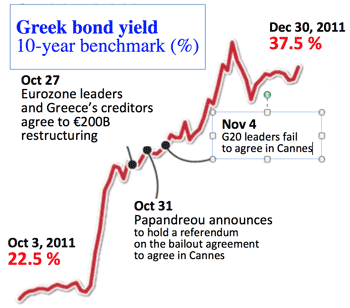
- Grexit: Greek Exit from EU
- No-bailout clause:
|
